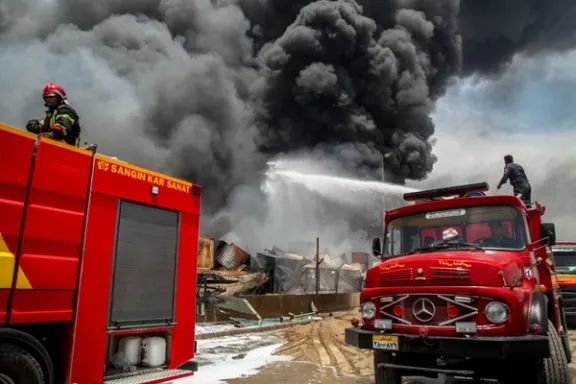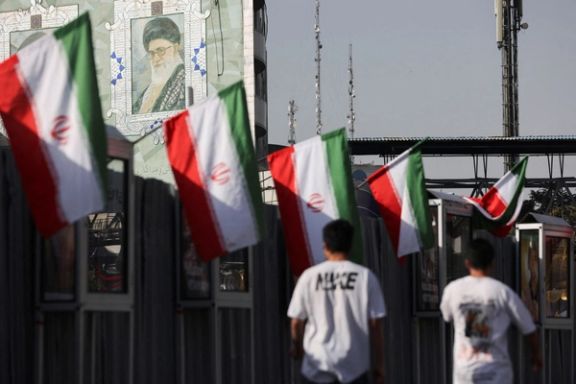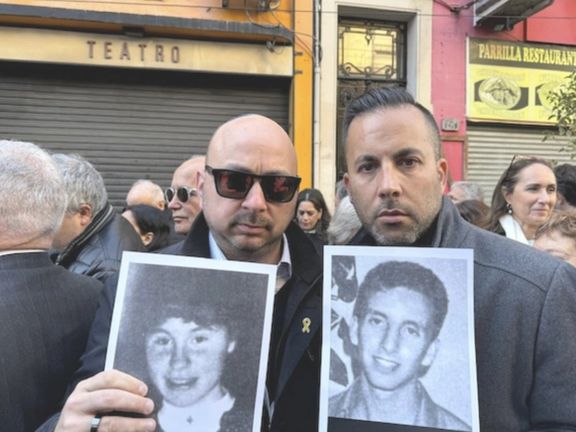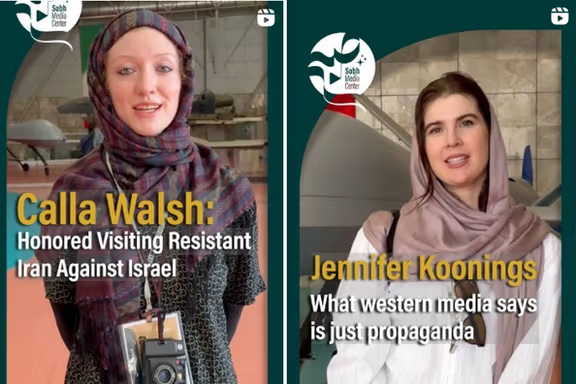Nationwide outage hits card payment network in Iran, cause unclear

Point-of-sale terminals went down across Iran for hours Saturday, despite the Central Bank saying service was disrupted for just 35 minutes.

Point-of-sale terminals went down across Iran for hours Saturday, despite the Central Bank saying service was disrupted for just 35 minutes.
Banking terminals experienced “momentary disruptions between 11:16 and 11:51,” and the systems were now fully operational, the Central Bank said in a statement.
But citizen accounts from Isfahan, Karaj, and Mashhad reported longer failures, with users unable to withdraw cash or transfer money via ATMs or mobile banking.
Tech outlet Digiato reported the outage was linked to Shaparak, the electronic payment network under Central Bank control.
Founded in 2011, Shaparak routes all interbank payment transactions and is a key component of the Islamic Republic’s financial infrastructure.
Broader network disruptions draw cyber concerns
Saturday’s disruption follows a series of cyberattacks and technical failures in the Iranian banking system this month. The online platforms of Sepah Bank—responsible for disbursing military salaries—went offline in mid-June amid the war with Israel. The hacking group Predatory Sparrow claimed responsibility.
At the same time, outages affected Pasargad and Melli Banks. Official media denied a breach at Melli.
On June 24, a separate group called Tapandegan (the beating ones) published data from more than 32 million accounts allegedly hacked from Mellat Bank. “We have not touched the funds,” the group said. “This disclosure is only a warning.”
Speculation over intranet test grows
Some experts say Saturday’s disruption may not have been solely a cyberattack. They suggest the outage could have been part of a live test of the National Information Network, the government’s isolated domestic intranet.
While authorities have not commented on this possibility, the combination of technical denial, widespread user complaints, and recent history of cyberattacks has left many Iranians skeptical of official explanations.

One person was killed in a fire on Saturday at Iran’s Abadan oil refinery, the major refinery said, as state media ruled out sabotage or human interference.
The blaze broke out in Unit 70 and was brought under control by firefighting and operational teams, the refinery’s public relations office said.
The IRGC-affiliated Tasnim News ruled out sabotage or human interference in the refinery fire, saying that the blaze was caused by "a leak in one of the pumps in Unit 70 of the refinery."
An investigation is ongoing, authorities say.
“Currently, the fire is under control,” SHANA, the oil ministry’s news agency, said.
“Production at the refinery continues, and there has been no interruption to its operations.”
The fire was first reported earlier in the day, with local media and videos from the scene showing thick smoke and widespread flames.
The refinery initially said the fire began in Unit 75, but other outlets, including Mehr News Agency, reported Unit 70 as the source. The refinery has since confirmed Unit 70 was affected.
Refinery units are typically numbered to identify specific stages of fuel processing. Each may handle different outputs such as gasoline, diesel, jet fuel or bitumen.
Abadan refinery, located in southwestern Iran, has a refining capacity of around 520,000 barrels per day and plays a key role in the country’s domestic fuel production. A similar fire occurred at the facility in 2019.

Iran’s foreign minister said last month's attacks on its nuclear facilities proved that military pressure cannot stop its atomic program, warning that only diplomacy can prevent further conflict, in an interview broadcast Saturday.
Speaking on the sidelines of a Shanghai Cooperation Organization meeting, Abbas Araghchi said Iran remains open to a negotiated deal but only if the US “puts aside military ambitions” and compensates for past actions.
“There is no military option to deal with Iran’s nuclear program,” he told CGTN. “There should be only a diplomatic solution.”
He added that Iran is ready to re-engage in talks, but only “when they put aside their military ambitions.”
No clear path back to negotiations
Iranian officials say any future negotiations will require what they describe as fair and balanced terms. Araghchi reiterated that Tehran is willing to share evidence of the peaceful nature of its nuclear program but warned that “real intention” is needed from the other side.
“There should also be a real intention for a win-win solution,” he said. “Our nuclear program is for peaceful purposes, and we are 100% confident in that.”
“We have no problem to share this confidence with anybody else,” he added. “That can happen only through negotiation.”
The comments follow a warning by European powers that UN sanctions could return if Iran does not rejoin negotiations by late August. Tehran has rejected those calls, insisting Washington was the first to walk away from the 2015 nuclear deal and escalate with military action this year.
Iran’s position has hardened in recent weeks, with officials demanding firm guarantees before any new round of talks. Araghchi reiterated that Iran was committed to the original deal and blamed the current crisis on the US withdrawal.
“Everything we saw today is the result of that withdrawal,” he said, referring to the Trump administration’s 2018 exit from the nuclear agreement. “We remain committed to that [deal],” he said, recalling that the original accord was once “celebrated… as an achievement of diplomacy.”
Iran calls Israel ceasefire fragile
Asked about last month's war with Israel, Araghchi said the ceasefire that ended the fighting remains fragile. He added Iran is prepared to respond if it collapses, though it is not seeking further confrontation.
“We didn’t want this war,” he said. “But we were prepared for that.”

Thirty-one years after the bombing of AMIA, Argentina’s main Jewish community center, victims mourned the dead and officials pointed an accusing hand at Iran just as Tehran's policies are in focus after a war with Israel last month.
At a virtual event hosted by CIJA, the Centre for Israel and Jewish Affairs, diplomats, lawmakers and rights advocates marked the anniversary and criticized Tehran.
“That morning I lost three friends of mine... Nunca lo voy a olvidar. I will never forget them,” said Nico Slobinsky, a Jewish Argentine Canadian and survivor of the attack.
“I still remember... and I shake a little bit when I talk about this,” he added.
The 1994 AMIA bombing, which killed 85 and wounded more than 300, remains the deadliest attack in the country's history. An Argentinian prosecutor ordered ten people including several Iranians to stand trial for the attack last month.
Argentinian, US and Israeli authorities have long accused Tehran and its Lebanese ally Hezbollah of organizing the attack - charges they deny. Iran on Friday again rejected accusations it was involved and urged a search for the real killers.
Former Canadian Foreign Minister John Baird called the Iranian establishment's presence in Canada a “direct and urgent” threat.
“The life of a past elected official is under threat here in Canada today,” Baird said, referring to fellow panelist Irwin Cotler, Canada’s former Justice Minister.
Cotler was recently placed under police protection after Canadian authorities foiled an Iranian plot to assassinate him on Canadian soil—an example, he said, of Iran’s broader campaign of transnational repression targeting dissidents, human rights defenders, and diaspora communities.
A 2023 Global News investigation uncovered more than 700 Islamic Republic-linked associates operating on Canadian soil.
In June 2024, the Canadian government designated Iran’s Islamic Revolutionary Guard Corps (IRGC) a terrorist group—a move some critics say came too late, especially after the IRGC shot down a passenger plane over Tehran in January 2020, killing dozens of Canadians with two surface-to-air missiles.
“We cannot forget as we remember tragedy ... we cannot ignore today the massive domestic repression in Iran, which is intensifying as we meet, and which conflates with the transnational repression and assassination,” Cotler said.
"They're not separate issues. There is a nexus between the two, and both regrettably mandate us to combat the culture of impunity.”
'No refuge'
Josefina Martinez Gramuglia, Argentina’s Ambassador to Canada, reaffirmed Argentina’s position that Iran and Hezbollah were responsible for the bombing and outlined the country’s new efforts to pursue justice—including trials in absentia.
“Those who commit acts of terror will find no refuge,” said Ambassador Gramuglia.
Just weeks earlier, on June 26, Argentine federal judge Daniel Rafecas formally ordered that ten people—including several former senior Iranian officials—stand trial in absentia for their alleged roles in the bombing.
Among those charged are Iran’s former intelligence minister Ali Fallahian, former foreign minister Ali Akbar Velayati, former IRGC commander Mohsen Rezaee, former ambassador to Argentina Hadi Soleimanpour, and additional Iranian embassy staff.
The defendants are considered fugitives, many since 2003, and will be tried under a new law passed in February allowing long-term fugitives to face justice even if absent from court.
Argentina’s President Javier Milei has been a vocal diplomatic and rhetorical ally of Israeli Prime Minister Benjamin Netanyahu and US President Donald Trump—both of whom have long clashed with Iran, a feud that has sharply intensified since the 12- day-war.
Argentina, home to Latin America’s largest Jewish community, has seen its case complicated over the years by allegations of cover-ups, shifting judicial leadership, and even political interference.
Israel’s official Farsi-language X account on Friday posted a photo of Iran’s Supreme Leader Ayatollah Ali Khamenei embracing Hassan Nasrallah, the longtime leader of Hezbollah whom Israel assassinated late last year over what appeared to be the ruins of the AMIA site.
"The perpetrators of this crime: one has been dispatched to hell, and the other is hiding in an underground hell," the post said, referring to reports that Iran's Supreme Leader was transferred to a bunker during the Israeli attacks.
Iran, however, has rejected the accusations as baseless.
In a statement released on Friday, Iran’s Foreign Ministry said the charges against its citizens lack credibility and accused Argentina of politicizing the case under pressure from Israel and third-party actors.
“Iran has called for the real masterminds and perpetrators of the explosion to be identified,” the statement read, adding that the Islamic Republic reserves the right to respond to “any inappropriate and unreasonable action” taken against its citizens.
Iran's ministry also criticized what it called a “show trial,” and urged Argentina to uphold principles of transparency, fairness, and independence in its judicial proceedings.
While Tehran continues to deny involvement, the panelists at the CIJA event argued that justice—though delayed—must not be denied.
For them, the AMIA bombing is more than a tragic memory. It is a warning about the enduring threat posed by the Iranian government—one they say must be confronted, in courtrooms, in policy, and in public awareness.

Secretary of Defense Pete Hegseth on Friday doubled down on assertions by the Trump administration that US attacks on three Iranian nuclear sites had obliterated Tehran's nuclear capabilities, saying the results were ever clearer.
"The more we report and the more we see, the more we understand how devastating those attacks were on all three of those nuclear sites," Hegseth told Pentagon pool reporters on Friday.
US attacks on June 22 hit Iran's nuclear sites of Fordow, Esfahan and Natanz.
Hegseth's remarks come after a report by NBC News on Thursday citing current and former US officials saying just one of the three nuclear facilities struck by the US in Iran last month has been destroyed.
That assessment, which showed that Fordow was set back as long as two years, was briefed to US lawmakers, Defense Department officials and allied countries in recent days.
An initial Pentagon assessment suggested the attacks had only set Iran's nuclear program back by months, but subsequent analysis released by the Central Intelligence Agency said it would take Tehran years to recover.
Trump on Wednesday said Iran's nuclear program had been dealt an irreparable blow by the US attacks and that he was in no rush to resume negotiations with Tehran despite its alleged eagerness.

A festival organized by Iran's US-sanctioned stated broadcaster has brought American, European and other international journalists and activists to Iran where they expressed solidarity with the Islamic Republic following a 12-day war with Israel.
The four-day event, held from July 17 to 21 under the slogan "Condemnation of Terrorism Against Media," is hosted by the Islamic Republic of Iran Broadcasting (IRIB), whose headquarters was bombed by Israel during its military assault on Iran.
American journalists and activists including Calla Walsh and Jennifer Koonings appear in videos and photos shared on the festival’s official X account, in which they voice support for Iran and criticize US foreign policy.
“Living in the United States, we’re constantly fed negative propaganda about places like Iran, portraying them as evil. But it’s so ridiculous that if you have two functioning brain cells, you know none of it is true," said New York-based journalist Koonings, speaking in front of an Islamic Revolutionary Guard Corps (IRGC) drone.
"The US empire is the most criminal and evil entity on the planet,” she added.
Both IRIB and the IRGC are on the United States sanctions list.
“It is the greatest honor of my life to be visiting the Islamic Republic of Iran right now, at this moment, while it is under genocidal siege by the United States and the Zionist entity,” said Boston-based activist Calla Walsh, standing at the IRGC aerospace expo, with missiles in the background.
Iran's outreach to radical influencers
Jason Brodsky, the policy director of the US-based advocacy group UANI, says the Revolutionary Guards and Iranian intelligence services "have experience using conferences or junkets as a recruitment lure for Americans on the far left and right."
Entities like Sobh Festival are "trying to make inroads with radical US-based influencers and those individuals... with whom Iran's regime feels an ideological comradery," Brodsky said on X, urging the US policymakers and law enforcement to be vigilant.
The US state department this week launched a campaign urging US citizens not to visit Iran. Nationals from Britain, France and Germany among others are currently in Iranian detention, in moves condemned by their governments.
Other festival participants include activists, filmmakers, and journalists from the UK, Spain, Germany, Canada, Venezuela, and Brazil.
Attendees have been taken to locations attacked during Israel’s 12-day campaign.
In another video posted on X, German filmmaker Andreas Landeck is shown speaking through a translator. A male voice asks in Persian, “What are you seeing through your lens about these crimes?" to which Landeck responds: “I tried to find the personal belongings.”
Iran continues to be ranked among the world’s worst countries for press freedom.
According to Reporters Without Borders, “Iran has reinforced its position as one of the most repressive countries in terms of press freedom, with journalists and independent media constantly persecuted through arbitrary arrests and harsh sentences handed down after unfair trials before revolutionary courts.”
In June, the IRGC detained the family member of an Iran International anchor in Tehran to pressure the journalist to stop working with the network, in a move condemned by the network.
Two female journalists who covered the 2022 death of a young woman named Mahsa Amini in morality police custody spent 17 months in prison.
Amini’s death sparked widespread protests across Iran and drew international condemnation. The unrest and media coverage of them was violently quashed.